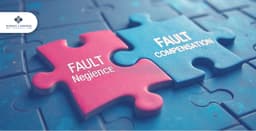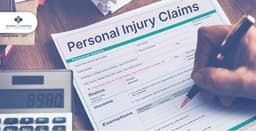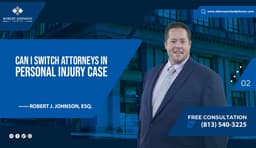
September 23, 2024
Why Personal Injury Claims Get Rejected and How to Avoid It
Dealing with personal injury claims can be tough, especially when you're trying to get compensation for an injury. Many people feel lost and upset when their claims are denied, unsure of what to do next. It's a situation nobody wants to face, but unfortunately, it happens more often than you'd think
To make the process easier, it’s important to know why claims often get rejected. Issues like not having enough evidence, missing deadlines, or disagreements about who’s at fault can all play a big role in whether or not a claim is successful.
Today, we’ll break down the common reasons why personal injury claims are turned down and share practical tips to help you avoid these problems, so you have a better chance of getting the compensation you need.
How personal injury is defined in Florida?
In Florida, personal injury laws are in place to make sure that if someone gets hurt because of someone else's carelessness or harmful actions, the responsible party has to pay for the damage. These laws don’t involve criminal charges or jail time. Instead, the person or company at fault has to give money to the injured person to help cover things like medical bills, lost wages, or other costs caused by the injury.
In which cases of personal injury can you file a claim?
There are several situations where you don’t have to suffer alone. You can seek civil help and file a claim legally. You can learn about Florida Statutes & Laws. They have certain rules and regulations about injury and if you have faced any situations like these you will get the compensation you deserve.
1. Vehicle Accidents:
If you’ve been injured in a car, motorcycle, or truck accident due to someone else’s negligence, you can file a compensation claim. This can cover medical expenses, lost wages, and pain and suffering. Florida follows a "no-fault" system, meaning your own insurance initially covers your damages, but you can pursue a claim against the at-fault driver if your injuries are severe.
2. Dog Bite Claims:
Florida law holds dog owners strictly liable for injuries their pets cause. If a dog bites you, the owner is usually responsible for your medical costs and other damages, regardless of whether the dog has a history of aggression. You can file a claim even if the bite occurred on the owner’s property.
3. Medical Malpractice:
When a healthcare provider’s negligence leads to injury or harm, you may have a case for medical malpractice. This includes errors in diagnosis and improper treatment. Filing a claim can help you recover damages for additional medical expenses, pain and suffering, and lost income due to the malpractice.
4. Nursing Home Abuse:
If a loved one has suffered abuse or neglect in a nursing home, you can take legal action against the facility. Nursing home abuse can include physical harm, emotional abuse, neglect, or financial transact. Florida laws protect the elderly, and you can file a claim to seek justice and compensation for your loved one. You can also file a report online for nursing home abuse.
5. Product Liability Laws:
When a defective or dangerous product causes injury, you can file a product liability claim. This can include anything from faulty machinery to unsafe pharmaceuticals. Manufacturers, distributors, and retailers can all be held liable if they sell a product that causes harm.
6. Premises Liability:
If you’ve been injured on someone else’s property due to unsafe conditions, you may have a premises liability claim. This can include slips and falls, inadequate security leading to an assault, or any other hazardous situation that the property owner should have addressed.
Common Reasons that a Personal Injury Claim is Denied in Florida
Here are the most common reasons why personal injury claims are denied in Florida:
A. Lack of Proof
Not seeking medical attention soon enough after the accident
Delayed treatment, which allows the insurance company to suggest something else could have caused the injuries
Insufficient documentation of injuries, medical records, police reports, photographs, eyewitness accounts, etc.
Claim Filed Incorrectly or Incompletely
Filing the claim too long after the accident occurred
Mistakes in entering details or not following the proper claim-filing process
B. Pre-Existing Injuries or Conditions
Insurance companies may deny claims by arguing the injuries were caused by a pre-existing condition rather than the accident
C. Failure to Mitigate Injuries
If you are found partially responsible for failing to avoid or mitigate your injuries, you may still be entitled to compensation in Florida as long as your fault is less than 51%
D. Delaying Medical Treatment
Waiting too long to seek medical care can give the insurance company a reason to argue you weren't seriously injured
E. Policy Exclusions
Certain accidents or injuries may be excluded from coverage under the fine print of the liability insurance policy
F.Insurance Fraud
Any insurance fraud voids coverage for the related claim under the insured person's personal injury protection
How to Respond to a Denied Claim?
Sometimes your valid claims are denied. That time, these are the Key Steps you must follow as a response to a denied personal injury claim in Florida:
Review the Denial Letter: Understand the insurance company's reasons for denying the claim.
Check your insurance policy: Look for any exclusions, errors, misleading information, or contradictions between the policy and the denial.
Dispute the Denial: Write a detailed letter disputing the decision, pointing out any policy errors or ambiguous issues.
Seek Legal Action: If the insurance company doesn't respond or continues denying the claim, consult a personal injury attorney about filing a lawsuit.
Hire a Personal Injury Attorney: An experienced attorney can help navigate the claims process, dispute denials, and file lawsuits. They can review your policy, handle communication with the insurer, and negotiate a fair settlement.
How to Avoid Claim Denials?
To avoid claim denials, it is essential to collect all necessary evidence, such as medical records, accident reports, and witness statements, immediately after an accident. Seeking prompt medical attention and understanding your insurance policy is crucial for establishing your case. Avoid admitting fault at the accident scene or in communications with the insurance company, as any admission can be used against you in your claim.
Engaging a personal injury attorney can help navigate the claims process, gather evidence, negotiate with insurers, and ensure your claim is filed correctly and promptly. Maintaining detailed records of all communications with the insurance company, including dates, times, and names of representatives, can be valuable if you need to dispute a denial.
What are the potential consequences of not hiring a personal injury attorney?
⇒ Loss of Compensation: Without legal expertise, you may struggle to accurately assess the value of your claim, potentially settling for far less than you deserve. This includes not accounting for all medical expenses, lost wages, and pain and suffering.
⇒ Difficulty Navigating Legal Processes: The claims process involves intricate paperwork that can be overwhelming. Mistakes in this documentation can jeopardize your case and lead to delays or denials. Establishing that another party was negligent is crucial for your case. This can be challenging without an attorney's knowledge and experience in gathering necessary evidence.
⇒ Emotional Burden: Handling a personal injury claim on your own can be emotionally taxing, especially while recovering from injuries. This stress can hinder your physical and emotional healing.
⇒ Insurance Company Pressure: Insurance companies often aim to settle claims quickly and for the lowest possible amount. Without a lawyer, you may lack the negotiation skills to counter their tactics effectively, leading to inadequate settlements.
⇒ Slower Case Progression: Without legal representation, your case may progress more slowly as you may not know how to push for timely responses from insurance companies
Curtain call
The key is to seek prompt medical attention, thoroughly document your injuries and the accident, and file your claim correctly and promptly. If your claim is denied, consulting with a personal injury attorney to understand your options is highly recommended. So don’t hesitate to reach out to us, we will help you to appeal the decision or file a lawsuit against the at-fault party.





























